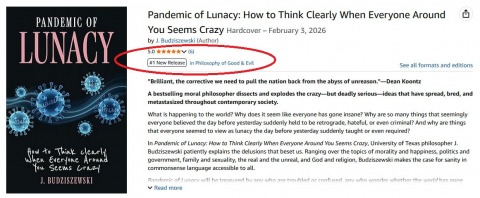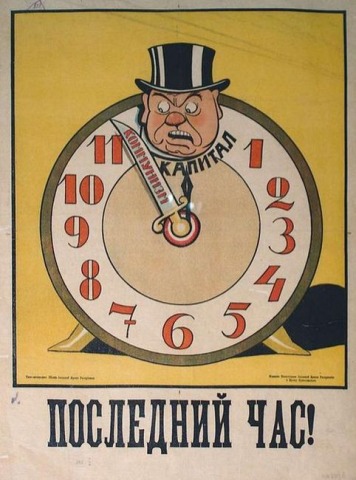
The Underground Thomist
Blog
MORE New StuffMonday, 02-23-2026
MORE new stuff! Last Monday I posted links to some new articles of mine and interviews about my new book Pandemic of Lunacy: How to Think Clearly When Everyone Around You Seems Crazy. I promised more items this week, and you’ll find them below. But first some more news: As of Tuesday the 17th, the book was Amazon’s #1 New Release in Philosophy of Good and Evil. Wednesday morning, the 18th, that flag had been replaced by #1 Best Seller in LGBTQ+ Political Issues (that was a surprise). Later on Wednesday, the flag was replaced with #1 New Release in Philosophy of Ethics & Morality. Apparently, when there is more than one flag, the flags rotate.
New Articles:“Why Scientists, Scholars, and Experts Are Not – and Cannot Be – Neutral Authorities” (Real Clear Books) “Open Our Eyes: A Vaccine for the Pandemic of Lunacy” (Touchstone, cover story) “There Is Only One Human Nature” (National Catholic Register) “No, Virginia, Each Person Does Not Have His Own Reality” (American Spectator)
New Interview:The Voice of Reason Podcast with Andy Hooser. Interview begins at 19:48.
And ...The Table of Contents and Introduction to the book are right here. You can get a 15% discount from the publisher’s website through the end of April by using the discount code PANDEMIC15. This discount code doesn’t work with Amazon, but you can get the Audiobook free from Amazon if you sign up for a free trial. If you read and like the book, I hope you will consider giving it a 5-star review on Amazon.
|
Pandemic of Lunacy Now Rated #1 New Release in Two More Amazon CategoriesWednesday, 02-18-2026
My wonderful readers will want to know that my new book Pandemic of Lunacy: How to Think Clearly When Everyone Around You Seems Crazy is still climbing in the ratings. I posted on February 6th that it was Amazon’s #1 New Release in its subject area in the audiobook category -- and it’s now the #1 New Release in Philosophy of Good and Evil, and #3 in Philosophy of Ethics and Morality, in the hardcover and kindle categories as well. The Philosophy of Good and Evil rating is shown in the image above, and you can see the #3 rating in Philosophy of Ethics and Morality by going to this Amazon page. I suspect that the rating of new releases is based largely on customer reviews, so if you read the book and like it, I hope you will consider giving it a 5-star rating on Amazon. Six are up already. And if you want to get a 15% discount, you can go to the publisher’s website and use the discount code PANDEMIC15. This is good through the end of April. God bless you all. We all need to avoid being infected with the virus of lunatic thinking, and I’m so glad that so many of you are enjoying the book. For your reading and listening pleasure, I’ll have a set of new articles and interviews related to the book in this coming Monday’s post.
|
New Stuff!Monday, 02-16-2026
New stuff! Here are some new articles of mine, as well as one of the first interviews about my new book Pandemic of Lunacy: How to Think Clearly When Everyone Around You Seems Crazy. More next week! By the way, the Table of Contents and Introduction to the book are right here. You can get a 15% discount from the publisher’s website through the end of April by using the discount code PANDEMIC15. The discount code doesn’t work with Amazon, but you can get the audiobook free from Amazon if you sign up for a free trial.
New articles:“Why Is There So Much Lying in Politics Today?” (Real Clear Politics) “Are We Just Animals? A Tempting Delusion” (Science and Culture) “Speaking of Reality: Men Are Not Women” (Daily Signal)
New interview:The Spectacle Podcast with Melissa Mackenzie and Scott McKay
|
Religion and RiskMonday, 02-09-2026
When my wife and I were still Protestant, but attracted to Catholicism, one of my issues was the Catholic practice of invoking the saints during prayer. In my boyhood I had been taught that this was little short of necromancy. However, I was just beginning to understand that Catholics don’t pray to the saints instead of praying to God, but in addition to doing so. For Catholics, this is an extension of the practice of all Christians to bear one another’s burdens and pray for each other. As we read in the Epistle of James, “The prayer of a righteous man has great power in its effects.” If I might ask a good and holy friend to pray for me, why not ask the mother of my Lord, who is even holier? Still, the practice was troubling, because, after all, couldn’t it happen that asking for the intercession of the saints might displace petitioning God Himself? In fact, I knew that it could happen. An Episcopalian lady I knew, herself a fallen-away Catholic, told me that she “felt closer” to Mary than to Jesus. This appalled me. As I came to learn, it also appalls the Catholic Church. Time and again, the Church emphasizes that wholesome Marian prayer is centered not on the Virgin herself, but on Christ. At the wedding feast in Cana, where we know Mary to have interceded with her son on behalf of friends who had asked for her help because no more wine was left, she didn’t say to the servants “Do whatever I tell you,” but “Do whatever He tells you.” When I learned to pray the Rosary, I found it helpful to think of Mary alongside me, helping me speak to her Son, speaking to Him along with me. A Catholic friend of mine helped me put this in perspective. “We want all the good stuff,” he said cheekily. Almost all the good stuff in the spiritual life is risky, but although the Church knows this, she views the risk differently that Protestants do. Traditional forms of Protestantism are risk-averse; their tendency is to view all spiritual risk as impermissible. But the Catholic view is that we should embrace all the good stuff while rejecting all the distortions. Don’t let the harmful things frighten you from enjoying the beneficial ones. Don’t let the false doctrines frighten you from embracing the true. From a Catholic point of view, that would be like cutting off one’s nose to spite one’s face. For example, to avoid unhealthy attitudes toward the dead, an Evangelical will decline to invoke the intercession of the saints at all. To avoid the temptation of drunkenness, a Baptist will use grape juice, not wine, to commemorate the sacrifice of Christ. To avoid the danger of polytheism, an old-fashioned Unitarian will reject the doctrine of the Trinity (though, curiously, modern Unitarians embrace every novel doctrine except the Trinity). Matters have gone so far that to avoid self-righteousness, some liberal Protestants decline to believe in God at all. By contrast, a Catholic asks the saints to pray for him, but in the same spirit in which he would ask his dearest and holiest friends to pray for him. He celebrates the conversion of the Eucharistic bread and wine into the Body and Blood of Christ, but he doesn’t believe in using wine to get drunk. He affirms the Three Persons because they really are Three Persons, but insists that they are only One Substance. And he earnestly believes in God, but instead of taking credit for his belief, he regards it as God’s gift. The temperamental difference between the two attitudes toward risk cuts deep in theology, and may be one of the reasons why putting an end to the schism with Protestantism is so difficult – it was certainly one of mine. But I think the difference runs through other aspects of life too. Consider the reluctance of most modern philosophers to think big. Instead they debate one tiny question at a time, but at interminable length. Granted, a person who thinks big may make big errors. But often even the tiny questions can’t be seen clearly, except in the light of a larger framework of thought. Their answers don’t make sense, apart from a background of answers to a host of other questions.
Note: The illustration to this post, “Don’t Cut Off Your Nose to Spite Your Face,” is from a book by the nineteenth-century Baptist preacher Charles H. Spurgeon. Never let it be said that I don’t acknowledge my debt to the Protestantism of my boyhood!
|
Pandemic of Lunacy Audiobook is #1 New Release!Friday, 02-06-2026
Gentle readers, I’m happy to announce that the audiobook of my new Pandemic of Lunacy: How to Think Clearly When Everyone Around You Seems Crazy, narrated by Tim Morgan, is Amazon’s #1 New Release in the category “Ethics and Morality Philosophy.” By the way, the audiobook is free if you sign up for a free trial from Audible, which is Amazon’s audiobook company. AND I've just learned that Creed and Culture, the publisher, is offering a 15% discount, good through the end of April, if you order the physical book through the Creed and Culture website and use the discount code PANDEMIC15. This is good only at the Creed and Culture website, not at Amazon or any other seller. Happy reading! Or listening! It may help you be sane in an increasingly lunatic world. P.S. If you read and like the book, please consider giving it a 5-star rating on Amazon, on Goodreads, or on both, and please tell a few friends about it. My publisher tells me that this is enormously important in bringing the book to the attention of its natural audience. The times they are a’changin’.
|
Political Marketing and the Real Reason Why People DrinkMonday, 02-02-2026
Political branding has now reached alcohol. On the right, we have Tears of the Left, which is a bourbon, and on the left, we have Fascist Tears, which is a vodka. Distilling the tears of the other side seems to be a draw. The Fascist Tears people bill themselves as being "women-owned, queer-led," and say part of their earnings helps “fund the resistance,” for example promoting abortion. So far as I can tell, the Tears of the Left people are only interested in making a little money and having a little fun. Curious to know whether these political potions are drinkable or just a way to cash in on political identity, I looked up a few reviews. Tears of the Left is much more well known. Most reviewers didn’t actually review the bourbon itself, but only vented their spleen against its politics. On the other hand, a Fascist Tears customer who did like its taste was especially pleased with the organic packaging, commenting “I will recycle the entire package.” I couldn’t help but smile when one spirits reviewer declared that although Tears of the Left marketing “thrives on antagonism” (he meant it makes fun of snowflakes), Fascist Tears marketing is “slightly less combative.” It’s hard to see how calling people fascists is less combative than calling them snowflakes, or how it isn’t antagonistic to say “We prefer our ICE crushed.” Was he not listening to himself? He added that political marketing ruins the experience of drinking together, because people do it -- wait for it -- for “diversity and inclusion.” So now we know why people really drink. You learn something every day.
|
Gospel SocialismMonday, 01-26-2026
One grows so weary of socialism being touted as the meaning of the Gospel. We see this in the secular world, of course. But we also see it in liberal Protestantism, and in certain Catholic circles too. This is especially awful because it is, in the literal sense, a heresy. It isn’t compassionate, and it has nothing to do with the Gospel. “Nothing to do with it? How can you say that?” To answer the question with a question: Can you tell me where the Gospel says it is wrong for anyone to have more or less than another? You can’t. The Gospel praises generosity and warns against the love of money, but what it condemns isn’t inequality of wealth per se, but exploiting and neglecting the poor – “the widow and the orphan,” who have no one to provide for them. Much of what government does today in the name of caring for the poor actually hurts them, but that is a story for another day. I was talking about inequality. The common assumption is that the poor are poor because other people are rich. Therefore, if no one was rich, no one would be poor. For example, a recent article in the Vatican newspaper L’Osservatore Romano laments that the wealth of those it considers super-rich “would be enough to eliminate extreme poverty in the world 26 times.” In case you’re wondering, that article is what lit the fuse for this post. Never mind whether the statistic is accurate. Does the author really suppose that simply transferring money from haves to have-nots will eliminate poverty? And does he really suppose that the poor in poor countries are the ones who would get the transferred money? How tempting to think so. It would be so easy! Just take it away from the rich people and give it all away! And since most of us aren’t rich (I’m not), thinking so makes us feel wonderful. But it’s false. If the rich use their wealth in a way that promotes economic development, then by doing so they help the poor. Needless to say, they might not use their wealth in that way, but in a capitalist economy, it is in their interest to do so. On the other hand, if the poor remain untrained and uneducated, with unstable marriages and family structures, without opportunities and incentives for employment, they will remain poor no matter how much money they are given. Moreover, if the governments of the poor countries fail to enforce the rule of law and operate as kleptocracies, whatever money you transfer to them will go to their kleptocrats, not to their poor. If you want to help the poor, here or abroad, help them overcome those burdens. I am unpleasantly reminded of a minister in Appalachia whom I heard railing against “global capitalism” as the cause of poverty, but had nothing at all to say about finishing school, working whenever possible, not using drugs, and not having children until getting married. Thank God he wasn’t typical. Doing those things wouldn’t end all poverty – remember the widow and the orphan! -- but it would end, or ameliorate, a lot of it. Do you think I am being mean? We need to rethink what it is to be mean. Suppose we take away all the wealth of a man who has started a business and built a factory paying good wages to 500 people, and we simply transfer all that money to low-income people. The poor who get the money will live well for a day, but the structural reasons for their poverty will be untouched. In the meantime, 500 hard-working people will be thrown out of their jobs. Who is being mean now? Yes, the starving man needs a meal. Feed him. But if you think he needs only a meal, you are a lazy thinker, self-serving, and desperately wrong. You are making yourself feel good about the poor on the backs of the poor. I am also weary, so weary, of seeing the look in the eyes of young men who see a job as just a temporary way to earn enough money to buy the next fix – who work for a few days or weeks, get stoned, and never show up again. And please don’t think I hear about such young men only from books. I am on first-name terms with some of them. I know their mamas. I also know some young men who by the grace of God broke out of that trap, got married, work every day, and are gradually building lives for their families. What is the real problem with inequality as such? None. Ask instead what is the real problem with extreme wealth. Very well, what is the problem with extreme wealth? Now comes the pivot, for there really are two problems with it. Not the ones you think. The first problem is that it risks grave spiritual harm to the rich person himself. He easily comes to think too well of himself, failing to recognize how he is needy before God. A genuinely poor person bears many burdens, but at least he is not exposed to that temptation. Blessed are the poor in spirit, for theirs is the kingdom of Heaven. The second problem is that extreme wealth buys great political influence, and no economic system has built-in incentives for political influence to be used for the common good. I mentioned that under capitalism, it is in the rich man’s material interest to use his wealth in a way that promotes economic development, because doing so profits him too. But unfortunately, it is also in his material interest to use it in a way that gains him privileges, subsidies, and other advantages from the government, at the expense of everyone else. Even Adam Smith, the famous proponent of the “invisible hand,” warned sternly against that. In fact, it is simply untrue that big business today exerts influence in favor of capitalism. If capitalism means free markets, it has been quite a long time since most capitalists believed in capitalism, which is why Wall Street is now more generally allied with the political Left. What we call capitalism today is more like socialism with outsourcing. Yet how naïve to think that unmixed, out-and-out socialism would cure that problem. In fact it would only replace a merely-influential big business class with a nearly-omnipotent bureaucratic and political class. Under the present system, big business must contend with the countervailing influence of many other social groups, and that’s good. Under socialism, though, the bureaucratic and political class would have the power to crush all competition. This has been tried. It hasn’t worked out well. Under socialism we are all equal. Equally poor.
|






